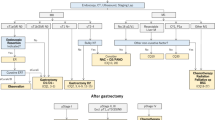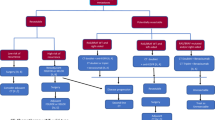Abstract
Purpose
Many different treatments are suggested by guidelines to treat grade 1−2 (G1−G2) neuroendocrine tumors (NET). However, a precise therapeutic algorithm has not yet been established. This study aims at identifying and comparing the main therapeutic sequences in G1−G2 NET.
Methods
A retrospective observational Italian multicenter study was designed to collect data on therapeutic sequences in NET. Median progression-free survival (PFS) was compared between therapeutic sequences, as well as the number and grade of side effects and the rate of dose reduction/treatment discontinuation.
Results
Among 1182 patients with neuroendocrine neoplasia included in the ELIOS database, 131 G1–G2 gastroenteropancreatic, lung and unknown primary NET, unresectable or persistent/relapsing after surgery, treated with ≥2 systemic treatments, were included. Four main therapeutic sequences were identified in 99 patients: (A) somatostatin analogs (SSA) standard dose to SSA high dose (n = 36), (B) SSA to everolimus (n = 31), (C) SSA to chemotherapy (n = 17), (D) SSA to peptide receptor radionuclide therapy (PRRT) (n = 15). Median PFS of the second-line treatment was not reached in sequence A, 33 months in sequence B, 20 months in sequence C, 30 months in sequence D (p = 0.16). Both total number and severity of side effects were significantly higher in sequences B and C than A and D (p = 0.04), as well as the rate of dose reduction/discontinuation (p = 0.03).
Conclusions
SSA followed by SSA high dose, everolimus, chemotherapy or PRRT represent the main therapeutic sequences in G1−G2 NET. Median PFS was not significantly different between sequences. However, the sequences with SSA high dose or PRRT seem to be better tolerated than sequences with everolimus or chemotherapy.

Similar content being viewed by others
References
A. Faggiano, P. Ferolla, F. Grimaldi, D. Campana, M. Manzoni, M.V. Davì, A. Bianchi, R. Valcavi, E. Papini, D. Giuffrida, D. Ferone, G. Fanciulli, G. Arnaldi, G.M. Franchi, G. Francia, G. Fasola, L. Crinò, A. Pontecorvi, P. Tomassetti, A. Colao, Natural history of gastro-entero-pancreatic and thoracic neuroendocrine tumors. Data from a large prospective and retrospective Italian epidemiological study: the NET management study. J. Endocrinol. Invest. 35, 817–823 (2012)
A. Dasari, C. Shen, D. Halperin, B. Zhao, S. Zhou, Y. Xu, T. Shih, J.C. Yao, Trends in the incidence, prevalence, and survival outcomes in patients with neuroendocrine tumors in the United States. JAMA Oncol. 3, 1335–1342 (2017)
M. Cives, J. Strosberg, Treatment strategies for metastatic neuroendocrine tumors of the gastrointestinal tract. Curr. Treat. Options Oncol. 18, 14 (2017)
N. Fazio, A. Ungaro, F. Spada, C.A. Cella, E. Pisa, M. Barberis, C. Grana, D. Zerini, E. Bertani, D. Ribero, L. Funicelli, G. Bonomo, D. Ravizza, J. Guarize, F. De Marinis, F. Petrella, E. Del Signore, G. Pelosi, L. Spaggiari, The role of multimodal treatment in patients with advanced lung neuroendocrine tumors. J. Thorac. Dis. 9, S1501–S1510 (2017)
A. Faggiano, F. Lo Calzo, G. Pizza, R. Modica, A. Colao, The safety of available treatments options for neuroendocrine tumors. Expert Opin. Drug. Saf. 16, 1149–1161 (2017)
M. Pavel, J. W. Valle, B. Eriksson, A. Rinke, M. Caplin, J. Chen, F. Costa, J. Falkerby, N. Fazio, V. Gorbounova, W. de Herder, M. Kulke, C. Lombard-Bohas, J. O’Connor, H. Sorbye, R. Garcia-Carbonero: Antibes Consensus Conference Participants; Antibes Consensus Conference participants. ENETS Consensus guidelines for the standards of care in neuroendocrine neoplasms: systemic therapy—biotherapy and novel targeted agents. Neuroendocrinology. 105, 266−280 (2017)
J.R. Strosberg, T.R. Halfdanarson, A.M. Bellizzi, J.A. Chan, J.S. Dillon, A.P. Heaney, P.L. Kunz, T.M. O’Dorisio, R. Salem, E. Segelov, J.R. Howe, R.F. Pommier, K. Brendtro, M.A. Bashir, S. Singh, M.C. Soulen, L. Tang, J.S. Zacks, J.C. Yao, E.K. Bergsland, The North American Neuroendocrine Tumor Society Consensus guidelines for surveillance and medical management of midgut neuroendocrine tumors. Pancreas 46, 707–714 (2017)
M.H. Shah, W.S. Goldner, T.R. Halfdanarson, E. Bergsland, J.D. Berlin, D. Halperin et al. NCCN guidelines insights: neuroendocrine and adrenal tumors, version 2.2018. J. Natl. Compr. Canc. Netw. 16, 693–702 (2018)
K. Öberg, U. Knigge, D. Kwekkeboom, A. Perren; ESMO Guidelines Working Group, Neuroendocrine gastro-entero-pancreatic tumors: ESMO Clinical Practice Guidelines for diagnosis, treatment and follow-up. Ann. Oncol. 23, 124–130 (2012)
A. Faggiano, A.C. Carratù, E. Guadagno, S. Tafuto, F. Tatangelo, F. Riccardi, C. Mocerino, G. Palmieri, V. Damiano, R. Siciliano, S. Leo, A. Mauro, L.F. Tozzi, C. Battista, G. De Rosa, A. Colao, Somatostatin analogues according to Ki67 index in neuroendocrine tumours: an observational retrospective-prospective analysis from real life. Oncotarget 7, 5538–5547 (2016)
F.T. Bosman, World Health Organization, International Agency for Research on Cancer: WHO Classification of Tumours of the Digestive System. 4th edn. (International Agency for Research on Cancer, Lyon, 2010)
W.D. Travis, E. Brambilla, A.P. Burke, A. Marx, A.G. Nicholson, WHO Classification of Tumours of the Lung, Pleura, Thymus and Heart (International Agency for Research on Cancer, Lyon, 2015)
R Core Team, R: A Language and Environment for Statistical Computing, Version 3.4.4 (R Foundation for Statistical Computing, Vienna, Austria, 2018), http://www.R-project.org/
A. Rinke, H.H. Müller, C. Schade-Brittinger, K.J. Klose, P. Barth, M. Wied, C. Mayer, B. Aminossadati, U.F. Pape, M. Bläker, J. Harder, C. Arnold, T. Gress, R. Arnold; PROMID Study Group, Placebo-controlled, double-blind, prospective, randomized study on the effect of octreotide LAR in the control of tumor growth in patients with metastatic neuroendocrine midgut tumors: a report from the PROMID Study Group. J. Clin. Oncol. 27, 4656–4663 (2009)
M.E. Caplin, M. Pavel, J.B. Ćwikła, A.T. Phan, M. Raderer, E. Sedláčková, G. Cadiot, E.M. Wolin, J. Capdevila, L. Wall, G. Rindi, A. Langley, S. Martinez, J. Blumberg, P. Ruszniewski, CLARINET Investigators, Lanreotide in metastatic enteropancreatic neuroendocrine tumors. N. Engl. J. Med. 371, 224–233 (2014)
M.E. Pavel, J.D. Hainsworth, E. Baudin, M. Peeters, D. Hörsch, R.E. Winkler, J. Klimovsky, D. Lebwohl, V. Jehl, E.M. Wolin, K. Öberg, E. Van Cutsem, J.C. Yao, RADIANT-2 Study Group, Everolimus plus octreotide long-acting repeatable for the treatment of advanced neuroendocrine tumours associated with carcinoid syndrome (RADIANT-2): a randomised, placebo-controlled, phase 3 study. Lancet 378, 2005–2012 (2011)
James C. Yao, Nicola Fazio, Simron Singh, Roberto Buzzoni, Carlo Carnaghi, Edward Wolin, Jiri Tomasek, Markus Raderer, Harald Lahner, Maurizio Voi, Lida Bubuteishvili Pacaud, Nicolas Rouyrre, Carolin Sachs, Juan W. Valle, Gianfranco Delle Fave, Eric Van Cutsem, Margot Tesselaar, Yasuhiro Shimada, Do-Youn Oh, Jonathan Strosberg, Matthew H. Kulke, Marianne E. Pavel, for the RAD001 in Advanced Neuroendocrine Tumours, Fourth Trial (RADIANT-4) Study Group, Everolimus for the treatment of advanced, nonfunctional neuroendocrine tumours of the lung or gastrointestinal tract (RADIANT-4): a randomised, placebo-controlled, phase 3 study. Lancet 387, 968–977 (2016)
J. Strosberg, G. El-Haddad, E. Wolin, A. Hendifar, J. Yao, B. Chasen, E. Mittra, P.L. Kunz, M.H. Kulke, H. Jacene, D. Bushnell, T.M. O’Dorisio, R.P. Baum, H.R. Kulkarni, M. Caplin, R. Lebtahi, T. Hobday, E. Delpassand, E. Van Cutsem, A. Benson, R. Srirajaskanthan, M. Pavel, J. Mora, J. Berlin, E. Grande, N. Reed, E. Seregni, K. Öberg, M. Lopera Sierra, P. Santoro, T. Thevenet, J.L. Erion, P. Ruszniewski, D. Kwekkeboom, E. Krenning, NETTER-1 Trial Investigators, Phase 3 trial of 177Lu-Dotatate for midgut neuroendocrine tumors. N. Engl. J. Med. 376, 125–135 (2017)
E. Raymond, L. Dahan, J.L. Raoul, Y.J. Bang, I. Borbath, C. Lombard-Bohas, J. Valle, P. Metrakos, D. Smith, A. Vinik, J.S. Chen, D. Hörsch, P. Hammel, B. Wiedenmann, E. Van Cutsem, S. Patyna, D.R. Lu, C. Blanckmeister, R. Chao, P. Ruszniewski, Sunitinib malate for the treatment of pancreatic neuroendocrine tumors. N. Engl. J. Med. 364, 501–513 (2011)
M.E. Caplin, M. Pavel, J.B. Ćwikła, A.T. Phan, M. Raderer, E. Sedláčkova et al. Anti-tumour effects of lanreotide for pancreatic and intestinal neuroendocrine tumours: the CLARINET open-label extension study. Endocr. Relat. Cancer 23, 191–199 (2016)
A.E. Hendifar, D. Dhall, J.R. Strosberg, The evolving treatment algorithm for advanced neuroendocrine neoplasms: diversity and commonalities across tumor types. Oncologist 24, 54–61 (2018)
I. Uri, S. Grozinsky-Glasberg, Current treatment strategies for patients with advanced gastroenteropancreatic neuroendocrine tumors (GEP-NETs). Clin. Diabetes Endocrinol. 11, 16 (2018)
L. Lee, T. Ito, R.T. Jensen, Everolimus in the treatment of neuroendocrine tumors: efficacy, side-effects, resistance, and factors affecting its place in the treatment sequence. Expert Opin. Pharmacother. 19, 909–928 (2018)
J.B. Cwikla, E.M. Wolin, M. Pavel, A.T. Phan, M. Raderer, E. Sedláčková et al. Final analysis of time to subsequent disease progression/death in patients with metastatic enteropancreatic neuroendocrine tumours progressing under placebo and switched to lanreotide autogel/depot 120mg in the Clarinet open-label extension. Ann. Oncol. 28, v142–v157 (2017)
F. Panzuto, M. Rinzivillo, N. Fazio, F. de Braud, G. Luppi, M.C. Zatelli et al. Real-world study of everolimus in advanced progressive neuroendocrine tumors. Oncologist 19, 966–974 (2014)
K. Kamp, B. Gumz, R.A. Feelders, D.J. Kwekkeboom, G. Kaltsas, F.P. Costa, W.W. de Herder, Safety and efficacy of everolimus in gastrointestinal and pancreatic neuroendocrine tumors after (177)Lu-octreotate. Endocr. Relat. Cancer 20, 825–831 (2013)
A. Angelousi, K. Kamp, M. Kaltsatou, D. O’Toole, G. Kaltsas, W. de Herder, Sequential everolimus and sunitinib treatment in pancreatic metastatic well-differentiated neuroendocrine tumours resistant to prior treatments. Neuroendocrinology 105, 394–402 (2017)
A. Plante, E. Baudin, C. Do Cao, O. Hentic, O. Dubreuil, E. Terrebonne, V. Granger, D. Smith, C. Lombard-Bohas, T. Walter, Patient-reported tolerance in treatments approved in neuroendocrine tumors: a national survey from the French Group of Endocrine Tumors. Clin. Res Hepatol. Gastroenterol. 42, 153–159 (2018)
Acknowledgements
Thanks to all the participants to the ELIOS (Educational Learning Investigational Observational Study) Multicentre Study for their support.
Author information
Authors and Affiliations
Consortia
Corresponding author
Ethics declarations
Conflict of interest
The authors declare that they have no conflict of interest.
Ethical approval
The study was conducted in accordance with the 1964 Declaration of Helsinki and approved by the ethics committee of each institution. All patients gave written informed consent.
Additional information
Publisher’s note: Springer Nature remains neutral with regard to jurisdictional claims in published maps and institutional affiliations.
Rights and permissions
About this article
Cite this article
Faggiano, A., Di Maio, S., Mocerino, C. et al. Therapeutic sequences in patients with grade 1−2 neuroendocrine tumors (NET): an observational multicenter study from the ELIOS group. Endocrine 66, 417–424 (2019). https://doi.org/10.1007/s12020-019-01894-0
Received:
Accepted:
Published:
Issue Date:
DOI: https://doi.org/10.1007/s12020-019-01894-0




